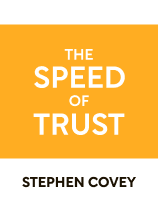

This article is an excerpt from the Shortform book guide to "The Speed of Trust" by Stephen M. R. Covey. Shortform has the world's best summaries and analyses of books you should be reading.
Like this article? Sign up for a free trial here .
What makes a person trustworthy? How do experts define trustworthiness? Why is being trustworthy one of your most valuable assets?
Stephen Covey identified five rules for what makes a person trustworthy in his book The Speed of Trust. According to Covey, by fulfilling these five rules, you can start building high-trust relationships in your personal and professional life.
Keep reading to learn Stephen Covey’s five rules for what makes a person trustworthy.
Defining Trustworthiness
After recognizing the importance of trust and thinking of it as a measurable quantity, Covey suggests learning how to cultivate trust in your personal and professional relationships. The first step in learning how to build trust is understanding what makes a person trustworthy. According to Covey, trust comes from credibility, which has four components: principles, motives, skills, and track record. He calls these the “four cores of credibility.” We’ll refer to them as the building blocks of trust. To merit trust in any situation, you must display all four building blocks of trust. Any missing or questionable building block can erode people’s trust in you and your trust in yourself.
How to Be Trustworthy
We’ll review Covey’s advice on applying the five rules for what makes a person trustworthy to your behavior.
(Shortform note: Covey highlights “13 behaviors” that build trust. We’ve condensed them into five rules since many of Covey’s 13 behaviors contain overlapping advice.)
Rule #1: Be Authentic
To build trust, you should strive for an authentic communication style. Covey explains that people should come away from conversations with you with the right impression of your intentions and motivations. He notes that people are good at spotting inauthentic communication, for example, spinning or telling only parts of the truth. Unfortunately, these tactics waste time, and you pay a hefty trust tax on all future communication when people don’t see you as authentic.
Rule #2: Treat People Well
To build trust, you must treat people well, which, according to Covey, takes consideration and humility. We’ll briefly look at each.
Consideration: To build trust, you need to be considerate of everyone, all the time. People may question your motives and nature if you only show consideration when you feel you have something to gain.
One way to be considerate is to be an active listener. Covey explains that what makes a person trustworthy includes actively listening to other people before adding your own opinions.
Humility: The way you handle failure communicates humility and impacts people’s trust in you. People are more likely to trust someone who is open about their mistakes. Covey explains that making a mistake and making excuses or trying to blame someone else for it depletes trust twice: first when people doubt your proficiency and then when they question your nature. Likewise, for people to be at their most innovative and productive, they need to feel comfortable enough to take risks and make their own mistakes.
Rule #3: Be Competent
Covey believes what makes a person trustworthy includes demonstrating competence. Covey explains that one of the fastest ways to build trust is to get people the results they are looking for. The more you deliver results, the more freedom and flexibility you have in your relationships because people will trust you to get the job done with little oversight. In contrast, you pay a trust tax when you make commitments you can’t keep. According to Covey, this is why you need to be realistic and honest about the projects you take on.
Rule #4: Be Explicit
Explicit expectations are important for trusting relationships. Covey notes that many trust taxes result from different ideas about what an outcome should look like. For example, results might look like a success to one person and a failure to someone else if they are not on the same page before a project starts. Clarifying expectations upfront builds trust and saves time and conflict down the road.
Rule #5: Be Trusting
One of the best ways to get trust is to give it. Covey explains that people have a natural inclination to trust and an innate desire to be trusted. He argues that when people are trusted, they almost always rise to the occasion. In contrast, when they feel like they aren’t trusted, they may (consciously or unconsciously) underperform or even act in untrustworthy ways. Therefore, even though it might seem scary, Covey assures you that you will get the most out of your personal and professional relationships (reap the most trust dividends) when you choose to extend trust.

———End of Preview———
Like what you just read? Read the rest of the world's best book summary and analysis of Stephen M. R. Covey's "The Speed of Trust" at Shortform .
Here's what you'll find in our full The Speed of Trust summary :
- Why trust is the ultimate key to success
- A roadmap for building and leveraging trust
- An explanation of Steven Covey's “four cores of credibility”






